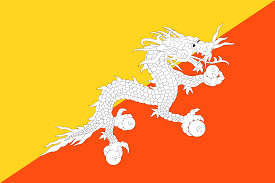
In October 2019, we spent a week or so in the last remaining kingdom of the Himalayas. Years ago, there had been three: Sikkim, Nepal, and Bhutan. Today only Bhutan remains
In 1975, Sikkim joined India as its 22nd state after anti-royalist riots took place in front of the palace.
The Nepal monarchy suffered a mass murder in 2001. Crown Prince Dipendra shot and killed ten people, including his father King Birendra, and was himself mortally wounded by what was allegedly a self-inflicted gunshot. Seven years later the monarchy was formally abolished on 28 May 2008.
The Bhutanese Royal family must have been worried and we were about to find out. Bhutan has a mere 750,000 people. It’s a bit of grit between the millstones of China to the north and India to the south. Even its flag, a struggling dragon crushed between two blocks of colour, seems to portray its predicament. 
Our visit was costly because each tourist has to pay $250 per day to include transport, guides, hotels and basic meals. Of this $65 goes directly to the government. Bhutan has a strategy of low volume, high value tourism, and it seems to be working. The International Monetary Fund has estimated Bhutan’s economic growth for 2019 at 5.5 percent, higher than the global growth forecast of three percent, but below a few countries in the region, including Bangladesh, Nepal, India, Maldives and China. Will we find good value there, we wondered as we left the Royal Singli Hotel, Kathmandu at 6.00 am on the 8 October 2019?
I hope these notes will help you make up your mind. Continue reading “Bhutan Discovered”









